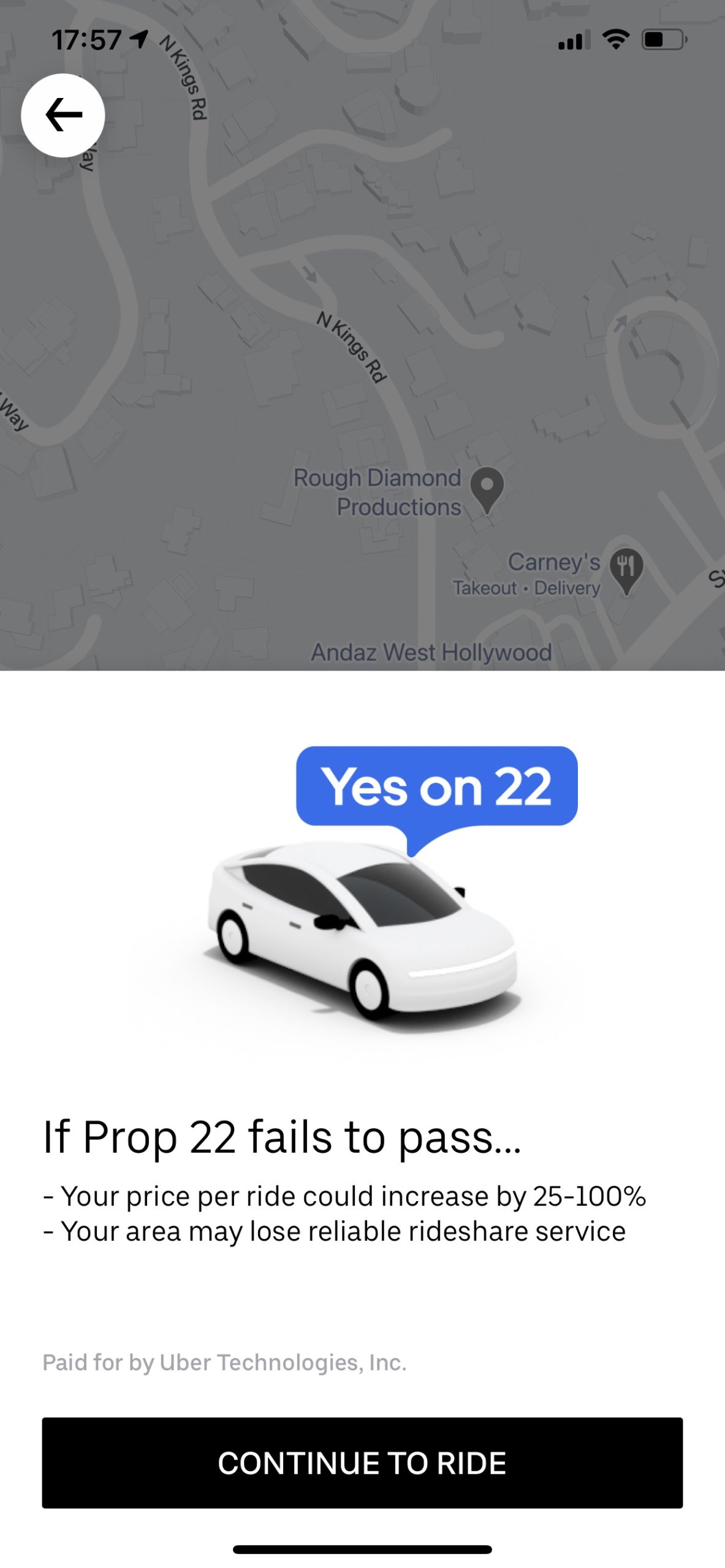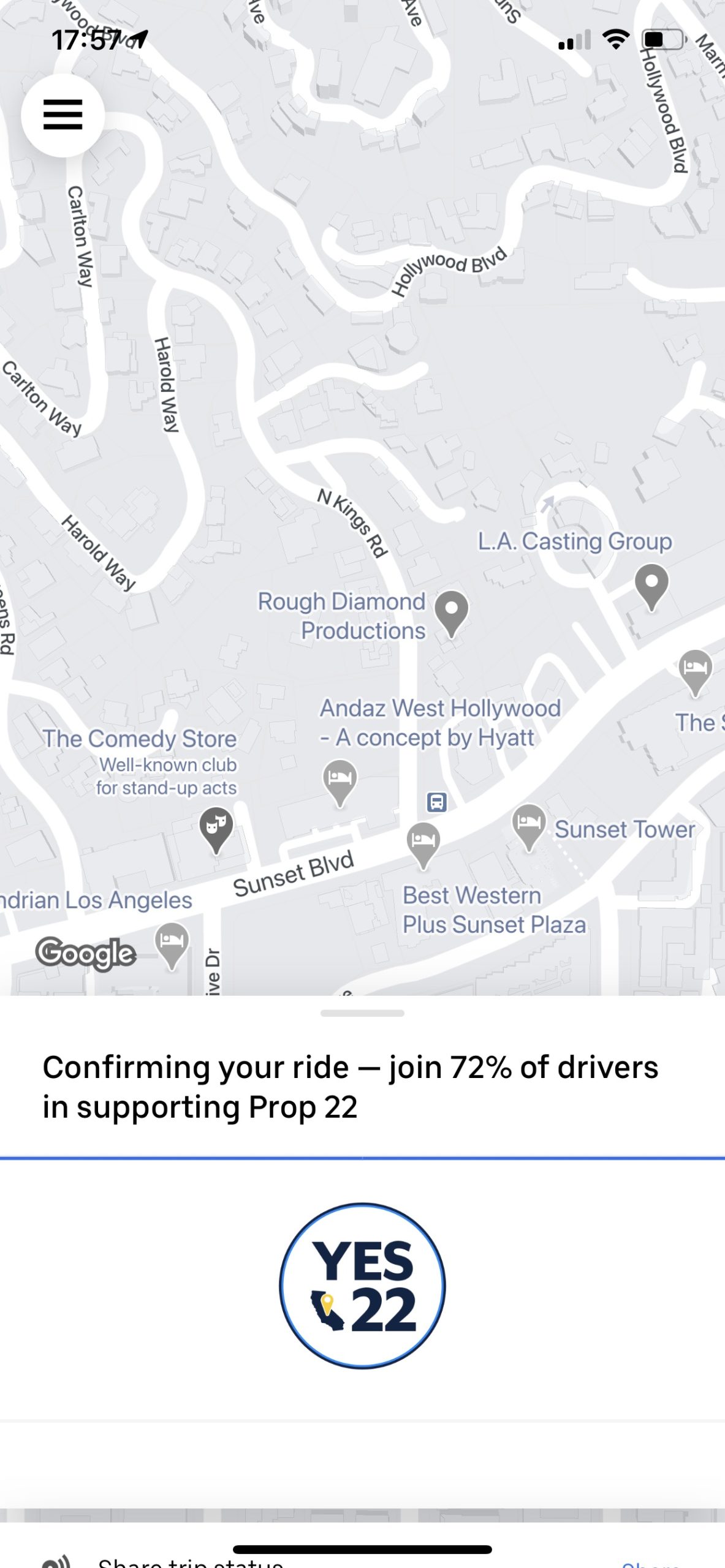Today is election day in the United States. In a country with deep internal division, there’s more on the ballot than choosing the next President. In California, Uber and Lyft are hoping voters will approve Prop 22, a controversial ballot initiative.
Prop 22 Will Chart Future Of Ride Sharing In California
I’ve discussed the issue before, but briefly California voters will decide today whether Uber, Lyft, and other app-based services can continue to hire drivers as independent contracts.
Per the California Voter Guide:
PRO
App-based rideshare and delivery companies could hire drivers as independent contractors. Drivers could decide when, where, and how much to work but would not get standard benefits and protections that businesses must provide employees.
CON
App-based rideshare and delivery companies would have to hire drivers as employees if the courts say that a recent state law makes drivers employees. Drivers would have less choice about when, where, and how much to work but would get standard benefits and protections that businesses must provide employees.
I certainly have a strong opinion on the ballot measure, but that’s really not the point in this post. Instead, I want to focus on how Uber has tried to influence its riders over Prop 22.
How Uber Is Trying To Influence California Voters
When you request a ride on Uber in California, you are first greeted with a warning. Uber warns that if Prop 22 does not pass, ride prices could rise by 25-100% and my area (Los Angeles) may lose ride service.

As your ride confirms, Uber reminds you that 72% of drivers allegedly support Prop 22.

It’s a poignant way to campaign to a captive audience. Uber and Lyft have also spent millions of dollars in ads across mediums. Too bad those dollars could not have gone to workers and solved this issue without such a spectacularly expensive campaign.
CONCLUSION
Doomsday warnings are often overblown, but I cannot see the thus-far unprofitable Uber/Lyft business model working if drivers are employees rather than independent contractors. People won’t pay taxi prices for Uber X. I certainly will not. We should know in the days ahead about the future of ride sharing in California. Until them, Uber is continuing to campaign hard.




Hate uber. Hate taxis more. Taxis need competition. Vote accordingly.
The only reason Uber has been able to exist is by taking advantage of people who desperately need work. I will gladly pay more if it means giving drivers a living wage. Driving is expensive, and the driver takes lots of liability. Often times, they are using their personal car, which puts wear and tear on something they need to be able to live. I hope it fails, Uber and Lyft won’t leave one of their biggest markets.
Would you rather four people make a living wage and six people be left unemployed than continue to permit 10 people to voluntarily choose to work part time for Uber or Lyft?
Nothing stopping you from leaving a fat tip for your drivers that you think deserve so much more.
If drivers have more profitable options to spend their time, then they are free to do so. Nobody bus forcing them to drive. Some people think freedom is a one way street. It’s not.
It is indeed surprising that these unprofitable companies would be willing to burn so much on this proposition, but this is basically life or death for them in California. The business model is dead if they are considered employees. Employers get to tell you when you have to work. Employers will also fire you if you are not profitable to keep on. From a consumer standpoint, the outcome is very predictable (if they even remain in service, which I don’t think they will): prices will rise dramatically, the number of drivers will fall, and the drivers will basically end up taking home about the same money, since the company will have to take a larger cut to have any chance of profitability. So they will end up destroying the income of the majority of drivers for really zero gain to those lucky enough to remain.
This is unskilled labor, after all.
Will leftists ever learn the laws of unintended consequences? Probably not.
Their business model is dead anyways. If their drivers are not employees, then they cannot legally set the price for their rides. Independent contractors would have to bid on the rides. It’s basic price fixing under the Sherman Act. Taxicabs get away with it because the local government sets their rates.
Don’t fall for the Uber/Lyft/Doordash propoganda. No way will they raise prices that much or exit the CA market. Competitors will swoop in and you’ll have a whole new ride share scheme. Or Uber/Lyft will come back to the legislature and negotiate better deals for drivers.
I don’t understand why any driver wants to be paid minimum wage to work for one company instead of a contractor for all of them. I am curious how many drivers understand they will not be able to be a full time employee for lyft, uber, doordash, etc at the same time? Yes, they will get a guarantee of some wages, but that also comes with the company being able to tell them what to do and where to do it.
I think this really pushes the companies faster towards their ultimate goal which is fully automated delivery without a driver so in the long run this is bad for drivers rather then helping them.
I really dislike when people sign up for something and then want to change how the whole thing works.
All the ride share companies rely on the drivers not understanding how much they are actually earning. Lets take an example, A ride to the airport from downtown SF cost like $30-$35 and is about 15 miles and takes 25-30 minutes on normal traffic. The driver gets paid like $20-$22. So lets say each week, the driver gets paid from Uber $1k. The problem is that this does not cover any of the cost of the driver, from gas to maintenance to healthcare. Although they get $1k in their bank accounts, it feels good but most of them don’t realize what the deferred maintenance and actual cost of the service they are providing to earn that $1k. If they realized it, they might as well just get a job at a retailer and earn the same or not more with benefits. The only good thing about this is that the driver gets to select their own schedule. I think prop 22 will pass cause the average voter don’t give a crap that drivers are not making much, they just care that they get a cheap ride. There is a reason why these companies spent so much on this. Whether this passes or not, the rideshare companies ultimate goal is to lose the human aspect of the service when autonomous cars come online, but I can’t see this coming anytime soon in the large cities.
yes, they have been clear they have no interest in keeping drivers long term. But what the drivers do now is also work for Lyft, Doordash, Grubhub, task rabbit, any other thing they can squeeze in as well so they aren’t just sitting around waiting for a ride with “uber”.
I don’t live in California but I’ve used Uber in the state previously (not for over 10-12 months though?) I’m getting emails from them constantly. Are they sending it to everyone in their email list or is it just people who have pinged a location in CA before? Just wondering…
Not sure. Interestingly, I have not received any email and I live here!
Corporate greed is real but Uber as a company loses money – their business model isn’t profitable. I’ve read that each ride we take is subsidized by as much as 25% from investor dollars to “gain market share.” No company will be able to gut it out for long hemorrhaging money. So the choice really is gig economy or nothing.
Looking only from a feasibility standpoint, there’s no way these companies can pay benefits and still stay in business – the money has to come somewhere and it’s definitely not coming from fares. Reminds me of unions who play hardball and then are surprised when the company goes under and everyone is worst off.
Uber left Austin, Texas. They came back but not for 3 years. London and Vancouver did not allow Uber for many years.
I’m voting yes on Prop 22 only because the liberal ass students at my college (Stanford University) have been crying foul about. Suck my tits, libtards!
In Geneva, Switzerland, they just voted to raise the minimum wage to $25/hour (23 Swiss francs). A couple working 40 hours per week would earn $104,000 per year doing any low skilled job.
Do you fly on commuter airlines (regional airlines) like American Eagle or United Express? If so, why. The pilots are often earning slavery type wages.
Uber and Left would probably not be losing billions if they charged taxicab fares. I would rather ride an actual taxicab.
I really don’t like Uber. The app taxi idea is great but Uber the company is very bad.